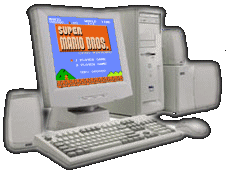Aaron Kaluszka 14 Dec 2001 Legal Issues One of the driving forces that caused emulation to become so popular was the advent of video game console emulation. The popularity of playing console games on a computer grew exponentially starting in 1995. Copies of cartridge data, or "ROMs" circulated the Internet like wildfire. While writing and distributing emulators is legal, the distribution of ROMs is not. Starting in 1997, the Interactive Digital Software Association, a conglomerate of software companies, began to crack down on websites that distributed ROMs. These websites often contained false legal information such as statements indicating that individuals could possess ROMs for 24 hours as a "trial" and then delete them. Since most of these games were long out of production, many companies did not mind too much. Nintendo did and still claims that people are not authorized to copy games to their computer, or even use emulators for that matter. These statements are false.
The real legal issues arose in 1998 when "next-generation" systems began to be emulated. The Nintendo 64 and Sony Playstation consoles were emulated, and Connectix and Bleem marketed commercial Playstation emulators. Sony immediately sued and had injunctions placed on the companies. Sony claimed that the reverse engineering of their system used to create the emulators was an illegal practice. The two defendants were able to remove the injunction and actually won the case against Sony. Reverse engineering of this sort is legal. Unfortunately, Bleem was forced out of business, in part due to court costs. These cases established and reinforced that emulation is legal. Unfortunately, the "underground" continues to distribute illegal copies of software to run on emulators, putting emulation in a bad light with many companies. Sources/Links:
© 2001, Aaron Kaluszka. All Rights Reserved.
|
